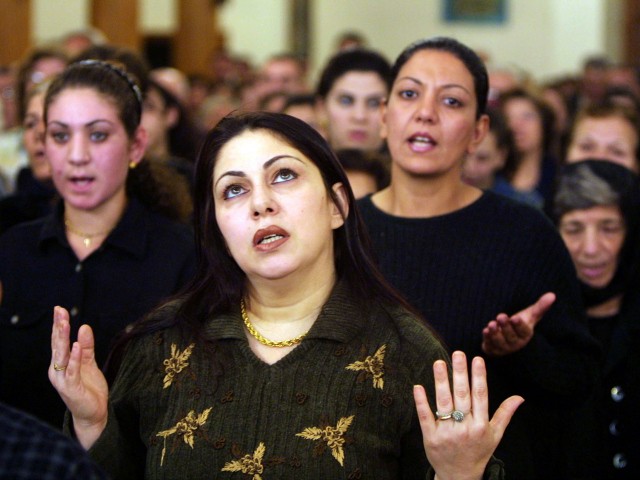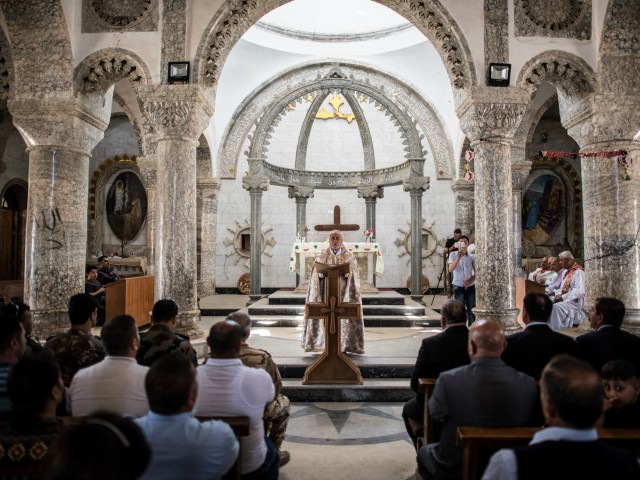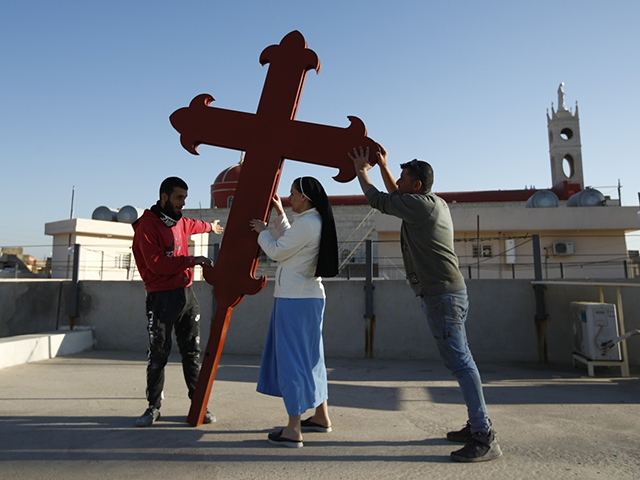The Kurdish news outlet Rudaw estimated in a report published Thursday that the southern Iraqi city of Basra lost 80 percent of its Assyrian, Chaldean, and Syriac Christians in the past two decades as a result of extreme persecution by jihadist groups.
Christians are indigenous to Iraq and have lived in substantial numbers in the country for two millennia. Despite this, and especially in the past 20 years, the community’s numbers have collapsed dramatically – first as a result of violence erupting following the American invasion in 2001, then escalating under the assault of the Islamic State “caliphate’s” genocide from 2014 to 2017.
Today, nearly 7 years after the fall of the “caliphate,” Iran-backed jihadist militias pose a significant threat to both Christian communities in the south and those who fled persecution and moved to the autonomous Kurdistan Regional Government (KRG).
The government of Iran itself also poses a threat to the KRG, where many Christians have resettled. The Iranian Islamic Revolutionary Guard Corps (IRGC) bombed Erbil, the capital of the KRG, in mid-January, destroying a local residence and killing most of the family residing there, including a child ten days shy of her first birthday.

File/A large number of Iraqi Christians have migrated due to threats to their lives, marginalization, lack of rights, insults, and even death threats. (Salah Malkawi/Getty Images)
“There are threats. That is why Christians migrate,” Aram Sabah, head of the Chaldean Archdiocese of Basra and southern Iraq, told Rudaw, describing Christians as taking any “opportunity” to find safety.
“There are many reasons that lead to Christian migration. When there is a weak law in place, or your rights are not given and you are considered a third-class citizen, you will migrate abroad whenever you see an opportunity,” Sabah explained. “It hurts us a lot. A large number of Christians have migrated due to threats to their lives, marginalization, lack of rights, insults, and even death threats.”
According to Rudaw, the Christian population of Basra has diminished from 7,000 families to 350 in recent memory. The region’s churches “lie empty,” many of them shuttered permanently.
“Fewer than 300,000 Christians remain in Iraq today, according to data obtained by Rudaw English from Erbil’s Chaldean Archbishop Bashar Matti Warda in 2022,” the Kurdish outlet detailed.
The Christian population has dropped rapidly in the past decade. Five years ago, the Christian aid group Aid to the Church in Need published a report in which it found that Iraq’s total Christian population dropped by 90 percent in the 20 years immediately preceding the study. Mosul, the ISIS “capital,” lost 99 percent of its Christians – 40 people.
“Christians had numbered 1.5 million before 2003 and yet by summer 2019, Christians in Iraq were ‘well below’ 150,000 and perhaps even ‘below 120,000.’ This means that, within a generation, Iraq’s Christian population has shrunk by more than 90 percent,” the report read.
Iraqi Christians have expressed outrage at the Iran-friendly government in Baghdad for not protecting Christians. Iraqi Cardinal Louis Raphael Sako, patriarch of the Chaldean Church, denounced the Baghdad government on January 22 for treating Christians as “strangers in the country” when they are an indigenous community to the land.
“Christians are indigenous Iraqis and are not a community from another country. They are people of this land, so it is not acceptable to label them as a ‘minority,'” Sako asserted, recalling that Christians “welcomed the Muslims and opened their schools, cultural centers and hospitals” when Islam began to spread in the Middle East in early medieval times, even helping to build mosques in Christian areas.
The Iraqi government must “assume its national and legal responsibilities by adopting practical and clear measures to ensure justice for Christians,” Sako demanded, including limiting the threat of Islamist militias.
Iraq legalized an umbrella group of mostly-Shiite Islamist militias, the “Popular Mobilization Forces” (PMF), amid the fight to uproot the Sunni Islamic State (ISIS) “caliphate” in the past decade. Following the eradication of ISIS from Mosul, its Iraqi “capital,” in 2017, the PMF turned against the groups most responsible for the victory against ISIS, the Kurdish Peshmerga and American allies, the groups most amicable to the dwindling Christian community. The PMF is a formal arm of the Iraqi armed forces even though several of its member militias are U.S.-designated terrorist organizations.

File/Iraqi Syriac Christian priest Charbel Aesso leads an Easter service at Saint John’s Church (Mar Yohanna) in the nearly deserted predominantly Christian Iraqi town of Qaraqosh on April 16, 2017 near Mosul, Iraq. (Carl Court/Getty Images)
Iraq is one of the world’s most dangerous places to be a Christian. In its annual World Watch List of persecution, published this month, the Christian aid organization Open Doors ranked Iraq number 16 among the world’s worst repressors of Christianity. It noted that Christians are a “significant minority” in central and southern Iraq and, even there, they fear making any overt displays of their faith.
“In places where they are the significant minority, like central and southern Iraq, Christians often do not publicly display Christian symbols, as it can lead to harassment or mistreatment at checkpoints, universities, workplaces or governmental offices,” Open Doors noted. “Christians from both historic and newer denominations can face discrimination from the government. Any outspoken Christian group can also be accused of blasphemy if it’s deemed it is sharing the gospel with Muslims.”
“Violence rose, making an already difficult place for Christians an even harder place to follow Jesus. Additionally, parts of Iraq that had traditionally been more tolerant of conversion have become more dangerous for anyone wishing to leave Islam to follow Jesus,” the report added.

COMMENTS
Please let us know if you're having issues with commenting.